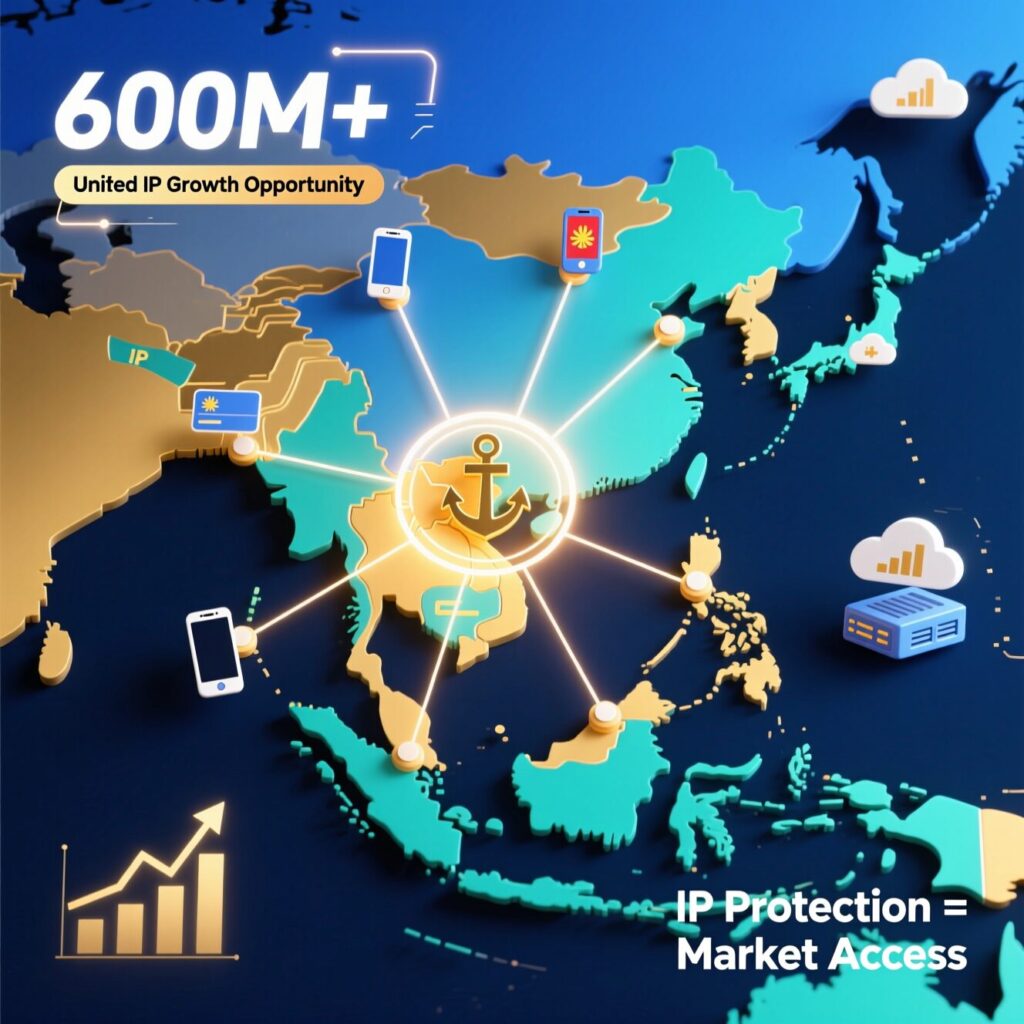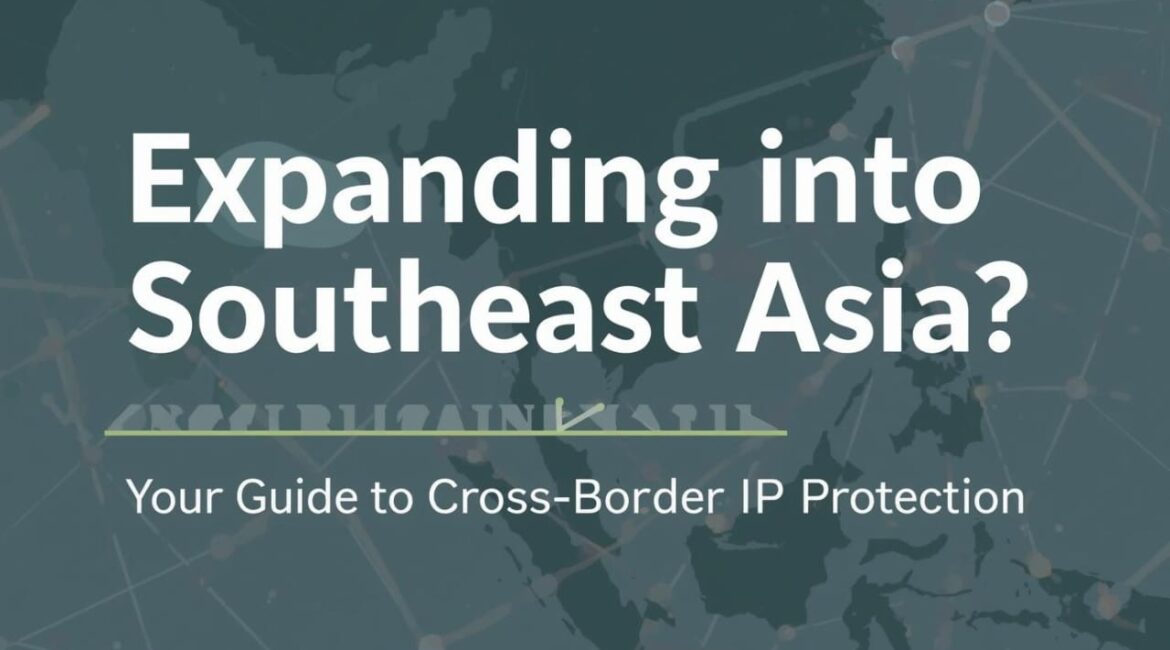As Southeast Asia is gradually becoming one of the fastest-growing economic regions in the world, companies from different corners of the world are expanding their businesses to capture new opportunities in ASEAN markets. However, expanding into these diverse jurisdictions will require an understanding of complex IP laws that differ from one country to another. Without a solid cross-border IP protection strategy, businesses risk losing their competitive advantage before they even begin.
Setting up a strong IP foundation is not just a matter of filing patents or trademarks; it involves understanding how to protect your ideas, brands, and technology across borders-from Singapore to Malaysia, Indonesia, Thailand, and beyond.
Why Cross-Border IP Protection Matters
Every ASEAN country has its own IP laws. While Singapore has an extremely efficient and transparent system of IP administration, the systems and mechanics for enforcement differ in other markets. In fact, businesses venturing regionally often face issues related to conflicting IP ownership rights, counterfeit products, or delay in enforcement processes.
A well-defined ASEAN IP protection plan helps avoid such situations by ensuring that your rights are registered and enforceable in each country of interest. This represents a fundamental step for companies planning the extension of production or distribution, enabling them to avoid disputes that may delay market entry or affect brand reputation.
Choosing the Right IP Lawyer for the ASEAN Market
Working with an IP lawyer in the ASEAN market can make all the difference. Experienced professionals are aware of not only local legislation but also that of international treaties, such as the Madrid Protocol and the ASEAN Framework Agreement on Intellectual Property Cooperation.
A qualified lawyer can help in:
- Determine which IP assets to protect first.
- Develop a strategy for registration across various ASEAN jurisdictions.
- Handle documentation, translation, and filing efficiently.
- Provide guidance in case of enforcement actions, when your IP is infringed.
Its position as a strategic regional IP hub makes Singapore an ideal base for coordinating protection across ASEAN. Many use Singapore as a gateway for access to other regions because of the modern infrastructure in terms of IP and its alignment with global standards.
Building a Practical IP Protection Strategy
A robust IP protection strategy begins long before a business enters a new market. Rather, it starts internally by auditing what intellectual property exists: from trademarks and patents to trade secrets to lines of software code. Once identified, the company must then decide where and how to protect each asset.
Here are three core steps to consider:
Regional IP Search and Filing:
Conduct searches in ASEAN countries to ensure your brand or technology isn’t already registered by another entity. After that, file your patents or trademarks simultaneously in your key target markets to minimize exposure.
Contractual Safeguards:
Include IP protection clauses in agreements with local partners, suppliers, or distributors, especially in cases of cross-border manufacturing or technology licensing agreements.
Monitoring and Enforcement:
Registration of your IP is merely the first step. Monitoring for infringements is continuous-online and offline. In cases of violations, prompt action must be taken through local authorities or through civil litigation. This is where cross-border IP enforcement becomes critical, as each country may require separate legal procedures.
Cross-Border IP Enforcement Challenges
Even with registrations in place, enforcement of IP rights throughout ASEAN can be challenging. Different legal systems, languages, and evidentiary requirements all too often result in inconsistent enforcement. For example, even though Singapore and Malaysia have developed specialized IP courts, in other countries, the emphasis may be more on administrative or police actions.
A proactive approach decreases the associated risks. Businesses can retain the services of regional IP consultants that coordinate enforcement efforts across multiple jurisdictions. Other firms, such as Pintas IP, go further by integrating legal, technical, and commercial expertise to deliver end-to-end protection, from investigation through litigation. Protect your ideas and innovations across ASEAN today. Contact Pintas IP Group Singapore for a consultation on your IP strategy.
Collaboration among ASEAN national IP offices, through the ASEAN IP Cooperation framework, also facilitated better cross-border enforcement. Businesses should also remember, however, that timelines and procedures can still differ per country.
ASEAN as a Unified IP Growth Opportunity
The diversity of ASEAN can indeed be a strength for businesses that plan strategically. With over 600 million consumers and an expanding digital economy, IP protection here gives access to one of the most dynamic regions in the world.
A single approach to IP allows brands to scale with confidence in multiple countries, with consistency of brand identity and ownership of technology. The legal reliability and infrastructure of Singapore provide a stable central hub from which regional expansion can be based.

Final Thoughts
Great opportunities arise with expansion into Southeast Asia, but so do the legal complications that might put your intellectual property in jeopardy. The investment in a sound IP protection strategy, in cooperation with a qualified IP lawyer for the ASEAN market, and advance planning for cross-border IP enforcement will enable your business to enter new markets with full confidence. In today’s interconnected economy, IP is not just a legal formality; it’s a strategic asset that defines your competitive edge. Protection across ASEAN means your ideas, innovations, and brand value remain secure wherever your business may grow next.

